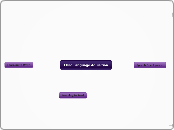jonka Danielle James 13 vuotta sitten
360
Child Language Aquisition - Danielle

jonka Danielle James 13 vuotta sitten
360

Lisää tämän kaltaisia
Pre-school Years At around the age of three there is a dramatic change in a child's language. Characterised by; * Use of 'and' leading to use of compound/complex sentences * Non-fluency - Children find it hard to produce more complex sentences and may start to repeat words and phrases as they struggle for what to say next * Use of 'and then' as they start to tell stories * Use of other conjunctions (around age 4) such as 'because', 'when' and 'while'.
The Telegraphic Stage When a child starts stringing together more thatn two words the utterances may be 2,3,4,5 words or longer. Utterances at this stage (around 2-3 years) are characterised by their lack of function words. Utterances consist mainly of content words i.e. nouns and verbs e.g. "Andrew want that".
The Two Word Stage Around the age of two once children have around 50 words in their vocabulary they begin to put words together to form small sentences or utterances. Most of their untterances however are only two words such as "more juice". During this stage there are no inflections to mark number, person or tense. pronouns are rare although children may use "me" to refer to themselves.
The Holophrastic Stage * Occurs at approximatley 12-18 months * Single word utterances e.g. "Teddy" "Gone" and "More" * 60% of childrens first utterances are nouns - people, animals and things that a child sees * Research by Katherine Nelson showed that these first words are often names of objects which are small and easily handled by the child, or things which more or make noises.
Errors * Underextension; the child restricts the applications of a word e.g. uses white only to describe snow. * Overextension; the child uses a word in a wider context than an adult would e.g. ball to not only describe a ball but also describe things such as marbles or a wheel.
The second year of a child learning language is split into several different stages. This is when a child is expected to start learning the language and forming sentences and words.
Parents and carers when looking after babies tend to; * speak slowly * Use simple vocabulary and short sentences * Widen the pitch of their voice * Have conversations with the baby even though they cannot form meaningful responses yet
Different stages of childrens aqcuisition in the first year are; * Biological Noises (0-2 months) * Cooing and Laughing (2-5 months) * Vocal play (5-8 months) * Babbling (6-12 months) * Melodic utterances (9-18 months)
In the first year of a childs learning language they are unable to form any grammatically correct words or sentences and most of their lerning the language is done through listening to their parents and carers.